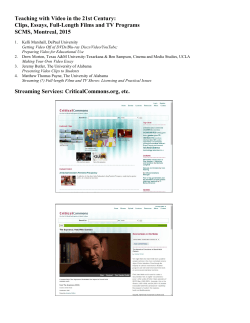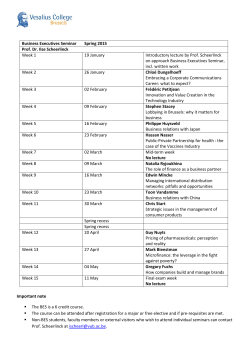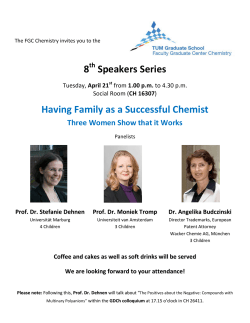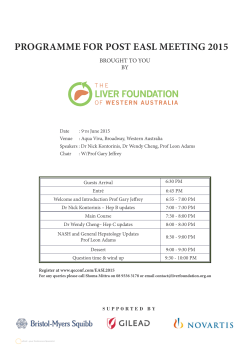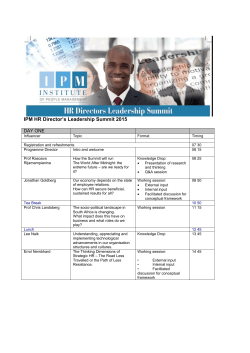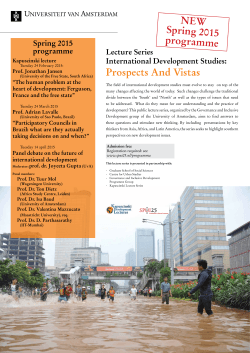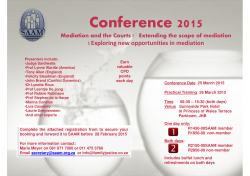
SCMS News April 2015.cdr - SCMS Cochin School of Business
SSTM awarded the highest rating of 'A' Grade National Assessment and Accreditation Council (NAAC), an autonomous body under UGC for the purpose of upholding the quality of higher education in India, has accredited SSTM awarding the highest rating of 'A' Grade with 3.19 points overall. The NAAC accreditation with 'A' Grade reaffirms the quality of teaching and learning in our School and provides reassurance to all stakeholders on our emphasis and relentless pursuit of excellence. Commerce fest On March 2, the BCom students organised their Commerce Fest which was inaugurated by Mr.K.L. Mohana Varma, popular novelist and short story writer. Dr.Radha P. Thevannoor, Group Director and Prof. N.Narayanan, HoD-Commerce also addressed the students. The students held cultural and literary competitions as part of the celebrations. Best paper award Ms.Sree Lakshmi K.R., Asst. Professor participated in the International Conference on 'Human Computer Interaction -Redefining Corporate Paradigms' organised by Women's Christian College, Chennai as part of its centenary celebrations on February 16 and 17. She presented a paper 'From Malls to Mobiles - Human Computer Interaction and the Transition from Market Places to Market Spaces' and won the Best Paper Award for the same. Book publication Dr. Sunil Jacob, Associate Professor-ECE, published a book titled 'Wireless Technology First Edition,' brought out by Lambert Academic Publishing (German Publisher) during March 2015. Staff achievements Ms. Anitha G. Pillai, Associate Professor-CE, has been awarded PhD in Civil Engineering by CUSAT. Mr. Sunil Jacob, Associate Professor-ECE, Anitha G. Pillai Sunil Jacob has been awarded PhD in Electronics Engineering by Bharatiar University, Coimbatore. Paper publications Dr. Sheeja Janardhanan, Associate Professor-ME, published a paper titled 'Environmental Effects on the Maneuverability of a Tanker' in the International Conference on Numerical and Experimental Marine Hydrodynamics 2014 at IIT Madras during December 10 and 11. Dr. Sheeja along with Praphul T., presented another paper titled 'Numerical Investigations on Aerodynamic Stall' in the International Conference on Emerging Research in Engineering and Technology 2015 at Kalavani Institute of Technology, Coimbatore during March 12 and 13 and the paper has been SSET Digest upgraded for publication in International Journal on Emerging Research in Engineering and Technology. Ms. Saira Joseph, Assistant Professor-ECE, published a paper titled 'CPW-fed UWB compact antenna for multiband applications' in the SCI-indexed international journal, Pr ogr ess in Electromagnetic Research C. Paper presentations Dr. Vinod P., Associate Professor-CSE, presented a paper titled 'Opcode Position Aware Metamorphic Malware Detection: th Signature vs Histogram Approach,' in the 9 IEEE India Com held at Bharati Vidyapeeth, New Delhi from March 11 to 13. Ms. Divya Nath K., Assistant Professor-EE, presented a paper on 'A Review on Non-destructive Methods for the Measurement of Moisture Contents in Food Items' in the IEEE International Conference on Circuit, Power and Computing Technologies-2015' organised by the Department of Electrical Electronics Engineering of Noorul Islam University, Kanyakumari during March 19 and 20. Seminars and workshops Mr. Niju P. Joseph, Assistant Professor-MCA and Mr. Varun G. Menon, Assistant Professor-CSE, participated in Faculty Enablement Programme on Foundation Programme 4.0 conducted by Infosys at Nehru College of Engineering and Research Centre from March 16 to 18 and both were awarded with A Grade. Dr. Vinod P., Associate Professor-CSE, delivered a talk on 'Crypto Watermarking and Image Security' during the Workshop on 'Image Sensing, Medical Imaging and Satellite Image Processing,' sponsored by ACM as part of Faculty Development Programme at IIITM-K, Technopark, Trivandrum during March 20 and 21. Mahindra AQ workshop In association with Mahindra & Mahindra, SSET conducted a fiveday workshop on 'Sustainability with automobile' during the period February 12 to 17. 'One tree-one vehicle', social network campaign, 'me and my vehicle', vehicles and ladies, driving habits on road, technology and vehicles and eco-friendly vehicles were some of the themes discussed in various sessions. Prof. P.C. Pillai, Senior Group Director, SCMS Group, inaugurated the awareness programme. Prof. M. Madhavan, Director-SSET, presided over the function. Prof. E.D. Mukundan, HoD-AE presented the theme address. Mr. Manoj Kumar B., and Mr. Sujay K., Assistant Professors also spoke. Vol : 11 No : 1 April 2015 A Monthly Newsletter of SCMS Group of Educational Institutions, Cochin A life of harmony had made. Within a short time the neighbours became good friends leading a peaceful and happy life. In ancient China there was a farmer with a neighbour The ultimate purpose of all our endeavours should who was a hunter. The neighbour had a pair of definitely be to improve the quality of our life. ruthless and poorly trained hunting dogs. The dogs Then, what precisely can be the crucial engine that used to jump over the fence frequently and chase the ensures quality of our life? Money? Power? Fame? farmer's lambs. With all the enormous money, power and fame The farmer had complained to the neighbour time enjoyed by Saddam Hussain, his life ended up in Dr.G.P.C.Nayar and again with a plea to keep the dogs chained; but, utter disaster. What was it that led to his tragedy? Founder & Chairman failed to get any positive response. It made the His inept relationships. SCMS Group of farmer's life miserable. One day when the dogs again Educational Institutions Even after more than six decades of our crossed the fence and attacked the lambs severely independence why our country has not been able injuring a good number of them, he got fed up. He went to town and consulted a judge. The judge after to achieve the progress we should have made to ensure better listening carefully to his story replied: “If you want I can now quality of life to our people? One critical impediment to our punish the hunter and instruct him to keep his dogs locked up. peace and progress is our poor neighbourly relations. But, in the process you will lose a friend and gain an enemy. Dhirubhai Ambani was once asked by a journalist to spell out Which one will you rather prefer, a friend or a foe as your the secret of his monumental success in transforming his company from a small unit to a Fortune 500 company. He was neighbour?” categorical in his response that it was so simple; the success and The farmer was under confusion. He thought for a moment. His wisdom prevailed and he sagaciously answered, “I shall prefer a growth could be attributed to the trust and good relations the company enjoyed with its stakeholders. friend as my neighbour.” The whole concept of progress and quality of life boils down to “Okay, then I shall tell you a solution that will help to keep your lambs safe, and at the same time retain your neighbour a one integral constituent, that is, good relations based on trust. In business, we understand the need for giving emphasis to friend.” customer relations, employee relations, investor relations, Having heard the judge's solution, the farmer agreed. supplier relations, community relations, government relations, After returning home, the farmer put the judge's suggestions and so on. If our relationships are good everything else, money, into action without any delay. He took two of his best lambs and power, peace, progress and all, will fall in line. But, albeit all our presented them to his neighbour's two small sons. The children hard work, we are bound to fail, if our relationships are awful. were immensely happy and began to enjoy playing with the lambs. Seeing his sons' delight, the hunter had the need to Whether it is in our personal life, family, business or social life safeguard their newly earned playmates. So he built a new the absolute quality depends on one thing - the harmony in our doghouse for his dogs. Since then, the dogs never had the relationships. opportunity to jump over the fence and attack the farmer's lambs. In response to the farmer's generosity toward his sons, the hunter began sharing his game meat with the farmer. The farmer reciprocated by sending the hunter lamb meat and cheese he The highest form of education is not that is confined to imparting knowledge, but that brings life in harmony with all that exist in the world -- Rabindranath Tagore Dr.G.P.C.Nayar NATIONAL WORKSHOP ON WATER MANAGEMENT & AUDIT ‘Enabling efficient use of water, a great social service’ – Mayor Tony Chammany From L-R: Mr.B. Manojkumar, Prof. P. C. Pillai, Prof. M. Madhavan, and Prof. E.D. Mukundan SCMS School of Architecture Fresh water is the life blood of the planet. No one can survive without it. Water is a great medicine. It does away with the diseases and is the giver of health, strength, long-life, wealth and immortality. In the contemporary world, clean and safe drinking water is scarce. Nearly one billion people in the developing world don't have access to it. Yet, we take it for granted, we waste it. Today, water crisis is a matter of serious discussion and concern Contd. on page 2 Co-ordinating Editor - Mr. Sanal Potty Editorial Advisory Council: Dr. D. Radhakrishnan Nair, Prof. R. Sahadevan Edited and published by Prof. B. Unnikrishnan for and on behalf of SCMS Group of Educational Institutions, Prathap Nagar, Muttom, Cochin - 683 106 and printed at Maptho Printings, Cochin - 683 104. www.scmsgroup.org Email: scms@scmsgroup.org Kochi Mayor Tony Chammany inaugurating the valedictory session of the Workshop on Water Management and Audit. Sitting beside: L-R: Dr.Rathish Menon, SCMS Water Institute, Prof.M.Madhavan, Director, SSET, and Dr.C.Sengottuvelu, Professor & Head-Consultancy. Contd. from page 1 amongst all sections of the society. How judiciously we can utilise the water available without depletion is a major concern. Alarming situation for India India has 18 percent of the world's population, but has only 4 percent of total usable water resources. Half of India's water supply in rural areas, where 70 percent of the country's population lives, is routinely contaminated with toxic bacteria. As per a UN report, India will face the consequences if it will not plan for water conservation. The report had predicted that the situation would become grim in the next 25 years. SCMS Group's social commitment Social responsibility is one of the mainstays that support the academic and research work undertaken in SCMS Group, and it is also one of our strategic priorities, because we believe that our role in the field of education involves something more than simply imparting of knowledge and skills to our students. As active agents of social change, we aim to address and find solutions to social problems. While water crisis is looming large as the most important resource limitation of the century, the Consultancy Development Unit of SCMS and SCMS Water Institute jointly organised a two-day national workshop on Water Management and Audit on February 25 and 26. Experts from diverse sectors discussed on topics like research on water purification, availability of water, consumption pattern, innovative techniques for water conservation, green audit and water atlas. No substitute for water Inaugurating the workshop, Mr.T.P.Srinivasan, Vice Chairman and Executive Head of Kerala State Higher Education Council said that “in future the threat to international peace and security is not going to be land, but water.” We always think of oil as the most important resource constraint, but it is not so, he affirmed. “The big difference is that oil can be substituted” by other means, he argued, whereas “there is no substitute for water.” When per capita income rises, he revealed, you need more water. Whatever development that takes place in the society it speaks of the need for more water, he informed. In this context, all that we can do is to conserve whatever is available. Our efforts to manage with what we have should start with the water audit. We cannot do without it, he concluded. Prof.P.C.Pillai, Senior Group Director presided over the inaugural session. Dr.V.Raman Nair, Group Director and Dr.Sunny George, Director-SCMS Water Institute also spoke. No fragmented approach In his keynote address, Dr.E.J.James, former Executive Director, Centre for Water Resource Development and Management, Government of Kerala, described the eventuality and emphasised that his major concern was on the existing fragmented approach without proper integration or coordination between the various departments. He clarified that all the three securities like energy security; food security and health security “are directly depended on water security” and that is why “water security has to be tackled with top priority.” The afternoon was earmarked for group exercise on water audit which was led by Dr.Sunny George and Dr. Rathish Menon of SCMS Water Institute. The presentations by the various teams were made on the second day. Prepare yourselves to take risk – Dr.Subramanian Swamy Mr.T.P.Srinivasan, Vice Chairman and Executive Head of Kerala State Higher Education Council inaugurating the workshop. Others on the dais L-R: Dr.Sunny George, Director, SCMS Water Institute, Prof.P.C.Pillai, Senior Group Director, and Dr.V.Raman Nair, Group Director. Advanced technologies Dr.Kurian Baby, Country Director, IRC presented the topic, Water Security and Sanitation Nexus. Prof.(Dr.) Johannes Fritsch, University of RavensburgWeingarten, Germany and Scientific Advisor to SCMS Water Institute, shared his experiences in water management. He Prof.(Dr.) Johannes Fritsch explained the need for regulating and controlling ground water. They had lot of problems in Germany during the last four decades, he informed, in usage of river and lake water. But they were able to sort it out by treatment of water employing advanced technologies. Role model for India While inaugurating the valedictory session, Mr.Tony Chammany, Kochi Mayor announced that “the water policy of Kochi Corporation will be officially declared in May” next and it is going to be the first water policy of a local body in India. SCMS Water Institute is actively involved in developing the policy, he revealed. Kerala should become a role model for India in water conservation and in the journey towards achieving that objective, he urged, “let us march together.” It would be the greatest service we could do for the society, the Mayor concluded. Prof.M.Madhavan, Director, SSET presided. Dr.Rathish Menon, SCMS Water Institute and Dr.C.Sengottuvelu, Professor & HeadConsultancy, SCMS COCHIN School of Business, also spoke at the valedictory session. Infrastructure Financing: The Key to Sustainable Growth Finesse, the Finance Forum at SCMS COCHIN School of Business organised a national conference on 'Infrastructure Financing: The Key to Sustainable Growth,' on March 13. Inaugurating the conference Mr. Elias George IAS, MD, KMRL, elaborated on the Kochi Metro Rail project, one of the largest social infrastructure initiatives launched in the State in recent times, indicating how the project on completion would transform the city greener and pollution-free. While explaining the difficulties faced in financing the project, he remarked that the eco-friendly nature was the major attraction for the European funding agencies to come forward to support. He also highlighted the women-friendly character of the project reserving 50 percent of the jobs to women. Mr.V.G.Mathew, MD and CEO, South Indian Bank, in his keynote address, went into the main reasons for the failure of infrastructure projects in India. He concluded with a positive note that the recent measures taken by RBI would help to ease Mr. Elias George IAS, MD, KMRL inaugurating the national conference on Infrastructure Financing: The Key to Sustainable Growth. Others in the picture L-R: Mr.Venugopal C. Govind, Managing Partner, Varma & Varma, Mr.V.G.Mathew, MD & CEO, SIB and Dr.Filomina P. George, Director, SCMS COCHIN School of Business. the flow of funds to infrastructure projects leading to lesser delay in completion. Outstanding models Mr.Venugopal C. Govind, Managing Partner, Varma & Varma, in his presidential address emphasised that 50 percent of the funding would have to come from private sector. He commented that the RBI might not be the appropriate regulatory body to oversee infrastructure funding and suggested that a new regulator would be required. Dr.Filomina P. George, Director, SCMS COCHIN School of Business, welcomed the gathering. In the panel discussion that followed Mr.Abraham Thariyan, former Executive Director, SIB and Mr. Giby Mathew, MD, Celebrus Capital discussed on the Role of Banks and Financial Institutions in Infrastructure Funding. Mr Santhosh S., Associate Professor, chaired the session. In the post-lunch session Mr. Jyothi Kumar, Executive Director, KSIDC and Mr. Jaikrishnan G., Director-Management Consultancy, KPMG, discussed the Role of Institutional Facilitators in Infrastructure Funding. The session was chaired by Mr. A.V.Jose, Associate Professor. In the valedictory session, Dr.V.Raman Nair, Group Director, presided and Ms.C.A.Dipti Lunawat, Assistant Professor proposed the vote of thanks. Talk Ms.Cuckoo Joy, Manager, Center of Excellence (Risks and Contracts) of General Electrics, Texas, the USA, gave a motivational talk and interacted with the students on March 12. News from SSTM ‘Boost your self-confidence to achieve goals’ Lack of self-confidence is keeping Indian women away from achieving goals, said Ernakulam Assistant Collector Mrunmayi Joshy IAS. She was delivering the keynote address at the workshop on Women Caricaturist Ibrahim Badusha inaugurating the workshop on women empowerment and self-defence by sketching the caricature of Dr.Radha P. Thevannoor. Dr.Subramanian Swamy speaking on the Union Budget 2015-16 at SCMS COCHIN School of Business. Young people should learn to take risks, seek opportunities for progress and be prepared to become entrepreneurs, said Dr.Subramanian Swamy, former Union Minister and Professor of Economics, while lecturing on the Union Budget 2015-16 at SCMS COCHIN School of Business on March 3. The prevailing typical mentality to seek a job is disastrous, he cautioned. Describing the budget as an extremely important document, to lay the vision of the government for generating economic growth of the country, Dr.Swamy said that the present budget is a serious attempt to usher in a new policy framework incorporating the objectives, priorities, strategies and resource mobilisation measures for the projects. “In my opinion India's main objective should be to achieve a growth rate of 10-12 percent,” he explained, because a “12 percent growth rate means doubling the GDP in every six years.” Dr.Swamy emphasised that “the most important growth factor is not capital or FDI,” but the main thing the budget should focus is on “directing the policy to generate innovation.” You will get a huge benefit by way of technological progress, he added. For example, going for cars with hydrogen fuel cells will create a bulky benefit, he stated. Likewise, generating electricity with thorium will be a much more efficient choice. The real focus of the budget should be on employment promotion to youngsters, Dr.Swamy suggested. Prof.P.C.Pillai, Senior Group Director and Dr.Filomina P.George. Director, SCMS COCHIN School of Business also spoke. Empowerment and Self-defence, organised by the NSS Unit at SSTM in association with SCMS COCHIN School of Business and Centre for Empowerment and Enrichment, on March 10. Caricaturist Ibrahim Badusha inaugurated the workshop by sketching the caricature of Dr.Radha P. Thevannoor, Group Director. Dr. Filomina P. George, Director, SCMS COCHIN School of Business, Ms. Jyoti Aswani, Managing Partner, Aswani Lachmandas Group, and Dr. Mary Anitha P.A., Chairperson, CFEE also spoke. Faculty achievements Ms.Anjana S. Chandran, Assistant Professor-MCA, has been awarded PhD in Computer Science by MG University, Kottayam. Anjana S. Chandran Mr. A. V. Jose, Associate Professor and Mr. James Dominic, Assistant Professor have been certified as Accredited Management Teachers in Finance by the All India Management Association. A.V. Jose James Dominic
© Copyright 2025

